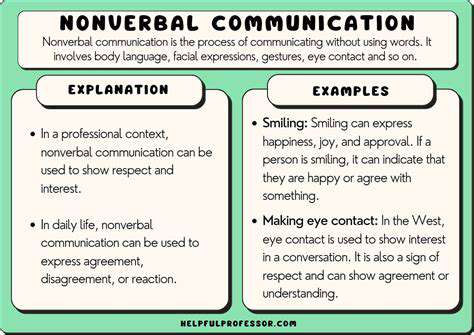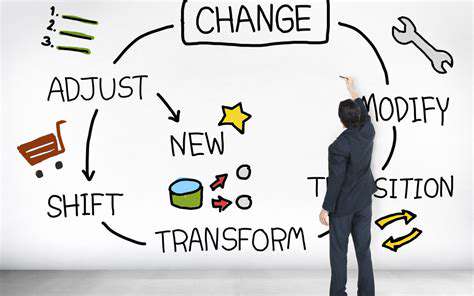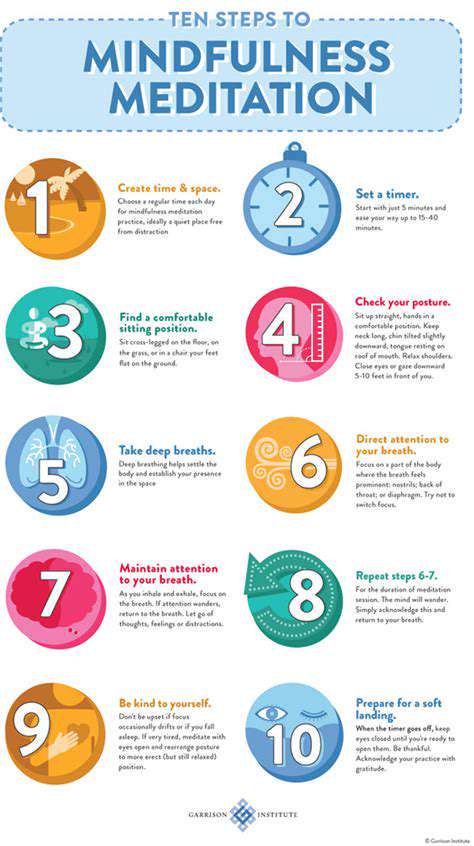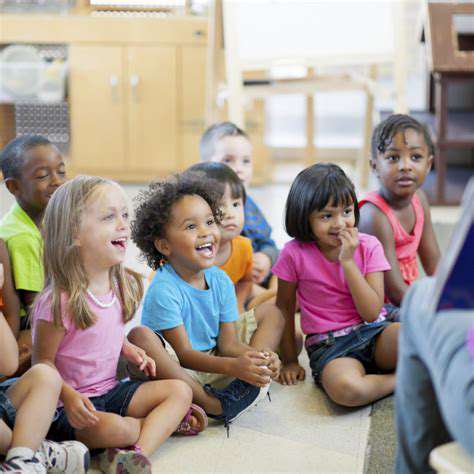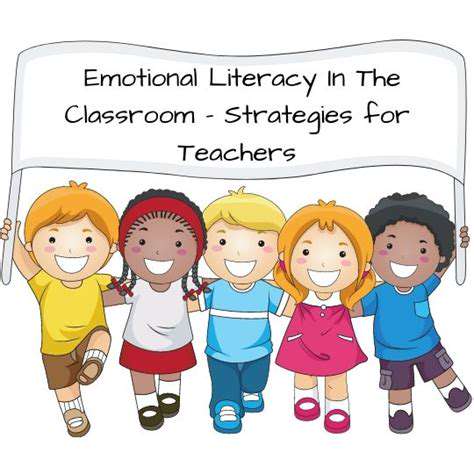Effective Strategies to Develop Strong Social Skills
Importance of Social Skills in Everyday Life
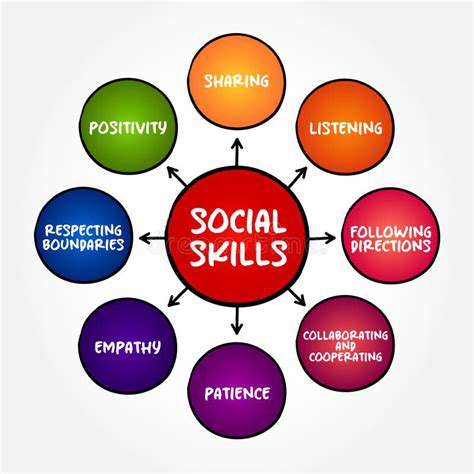
Understanding Social Skills
Social skills encompass a range of abilities that facilitate effective communication and interaction with others. These skills include verbal and non-verbal communication, active listening, empathy, and conflict resolution.
Strong social skills enable individuals to build relationships, collaborate with others, and navigate social situations with confidence. Having well-developed social skills is crucial for personal and professional success.
Additionally, social skills are not innate; they can be learned and improved over time with practice. This means that regardless of one's current skill level, there is always room for improvement.
Understanding the various components of social skills can help individuals identify which areas they need to focus on to enhance their interactions.
Building Empathy and Active Listening
Empathy is the cornerstone of effective communication, allowing individuals to understand and share the feelings of others. To develop empathy, one must practice putting themselves in someone else's shoes and recognizing their emotions.
Active listening is equally important; it involves fully concentrating on what is being said rather than passively hearing the message. Active listening fosters a sense of trust and respect in conversations.
Engaging in reflective listening, where one repeats back what they have heard, can improve comprehension and connection. This technique also shows the speaker that their thoughts and feelings are valued.
Both empathy and active listening contribute to healthier relationships and can turn potentially confrontational situations into constructive discussions.
Improving Verbal and Non-Verbal Communication
Effective verbal communication involves clarity, tone, and modulation of voice to convey messages appropriately. Being aware of one's word choice greatly impacts how the message is received by others.
Non-verbal communication, including body language, facial expressions, and eye contact, plays a significant role in interpersonal interactions. A positive posture and attentive eye contact can enhance the message being conveyed and build rapport with others.
Practicing these forms of communication by engaging with diverse groups of people can help one adapt their style and improve overall effectiveness. Understanding cultural differences in communication is also essential for successful interactions.
Consistent practice enables individuals to refine their verbal and non-verbal skills, making them more adept at conveying their thoughts and emotions.
Overcoming Social Anxiety Through Practice
Many individuals struggle with social anxiety, which can hinder their ability to engage in social situations. Overcoming this anxiety requires intentional exposure to social environments in a supportive and gradual manner.
Role-playing various scenarios with friends or family can serve as valuable practice for real-life interactions. This not only builds confidence but also helps individuals develop a set of strategies to handle different social contexts.
Participating in group activities, clubs, or classes can provide safe spaces for practicing social skills while enjoying shared interests. These environments encourage networking and interaction with others in a low-pressure setting.
As individuals become more comfortable in social situations, their confidence grows, significantly reducing feelings of anxiety and fear.
Key Strategies for Developing Social Skills
Understanding Non-Verbal Communication
Non-verbal communication plays a crucial role in how we interact with others. This includes body language, facial expressions, and eye contact. Being aware of these non-verbal cues can significantly enhance your social skills. For instance, maintaining an open posture and using appropriate gestures can make you appear more approachable and engaged.
Additionally, recognizing non-verbal signals from others can help you respond more effectively during conversations. For example, if someone seems closed off with crossed arms and minimal eye contact, it may indicate they are uncomfortable. Adapting your communication style to address these cues can foster a more positive interaction.
Practicing Active Listening
Active listening is an essential aspect of building effective social skills. It involves fully concentrating on what the other person is saying, rather than just passively hearing their words. To practice active listening, try techniques such as summarizing what the speaker has said or asking relevant follow-up questions. This not only shows that you are engaged but also helps clarify any misunderstandings.
Moreover, demonstrating empathy during conversations can strengthen your connections with others. When you actively listen and respond with validation or understanding, you create an atmosphere of respect and trust, which encourages more open and meaningful exchanges.
Enhancing Conversation Skills
Conversations can often be challenging, but improving your conversation skills can lead to more enjoyable interactions. Start by initiating discussions on various topics, ensuring you also invite others to share their thoughts. This balance creates a dynamic exchange where both parties feel valued and heard.
Additionally, don't shy away from sharing personal anecdotes or insights. This relatability can make conversations more engaging and memorable. Remember that humor can also be a powerful tool in conversations, as it helps to break the ice and build rapport, but it should always be used judiciously.
Cultivating Empathy
Empathy is at the heart of strong social skills. It allows you to connect with others on a deeper level by understanding their feelings and perspectives. To cultivate empathy, practice putting yourself in someone else’s shoes and try to see situations from their viewpoint. This can improve your ability to relate to others and respond appropriately in various social scenarios.
Engaging in activities such as volunteering or participating in community service can also enhance your empathetic abilities. These experiences expose you to diverse perspectives and challenges, fostering a greater appreciation for the experiences of others and ultimately enriching your social interactions.
1. Practice Active Listening
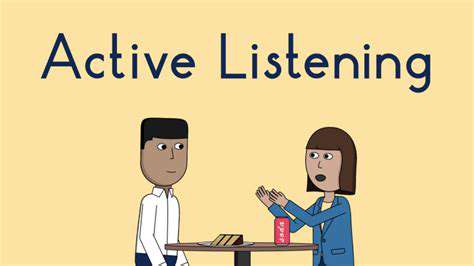
1. Understand the Importance of Listening
Listening is a crucial component of effective communication. It helps build trust and rapport with others. When you actively listen, you show respect for the speaker's thoughts and feelings. This, in turn, encourages open dialogue and deeper connections.
Active listening requires focus and attention. It means giving the speaker your full attention and avoiding distractions. By doing this, you demonstrate that you value what they are saying, which fosters a positive interaction.
Being a good listener can lead to improved relationships in both personal and professional settings. It can resolve conflicts and improve teamwork. When people feel heard, they are more likely to share their ideas and collaborate effectively.
To enhance your listening skills, practice mindfulness. This will help you stay present in conversations and respond appropriately to what is being said.
2. Foster Empathy in Conversations
Empathy is the ability to understand and share the feelings of others. Developing empathy is an essential strategy for building strong social skills. It allows you to connect more deeply with others and appreciate their perspectives.
When you practice empathy, you can respond to people's emotions more effectively. You become more in tune with their needs and concerns. This can create a supportive environment where individuals feel valued and understood.
One way to cultivate empathy is by asking open-ended questions. This encourages others to express themselves fully and fosters a sense of connection. Additionally, be mindful of non-verbal cues, as they can reveal a lot about how someone is feeling.
Empathy not only improves personal relationships but also enhances professional interactions. Understanding your colleagues' emotions can lead to more effective collaboration and increased workplace harmony.
3. Improve Non-Verbal Communication Skills
Non-verbal communication encompasses body language, facial expressions, and eye contact. These elements play a significant role in how messages are received. Improving your non-verbal skills can significantly enhance your overall social interactions.
For example, maintaining eye contact shows confidence and interest in the conversation. It can make the speaker feel acknowledged and appreciated. On the other hand, closed-off body language can create barriers and deter engagement.
Be conscious of your posture and gestures as well. Open and relaxed body language conveys approachability, while tense or closed-off postures can signal discomfort or disinterest. Practicing these skills will help you appear more inviting and engaged.
Furthermore, being aware of others' non-verbal cues can enhance your ability to respond appropriately. You will be better equipped to address unspoken concerns and adapt your approach based on the feedback you receive.
4. Engage in Social Situations Regularly
One of the most effective ways to develop social skills is through consistent practice. Engaging in various social situations allows you to apply what you have learned and gain confidence. The more you interact with others, the more comfortable you will become in social settings.
When attending events, challenge yourself to meet new people. Introduce yourself and initiate conversations with those around you. Establishing new connections can help you refine your communication style and learn from others.
Additionally, consider joining clubs or groups that align with your interests. This not only provides a platform for social interaction but also connects you with individuals who share similar passions.
Finally, reflect on your experiences after social interactions. Think about what went well and identify areas for improvement. Continuous reflection will aid in your growth and bolster your social skills over time.
2. Engage in Social Situations
Understanding Social Dynamics
To effectively engage in social situations, it's essential to understand the underlying dynamics that govern human interactions. Social dynamics involve the ways in which people communicate, interact, and influence each other within a group.
Recognizing social cues, such as body language and facial expressions, can significantly enhance your ability to connect with others. Being attuned to these signals allows for a more fluid and responsive interaction.
It can also be beneficial to observe how others successfully navigate social situations. By analyzing their behavior, you can identify techniques and strategies that you might want to incorporate into your own social engagements.
You can deepen your understanding of social dynamics by reading books or attending workshops on interpersonal communication. This theoretical knowledge will complement your practical experiences, leading to more effective engagement in social situations.
Ultimately, developing a solid grasp of social dynamics equips you with the tools necessary to interact meaningfully and build lasting relationships in diverse social settings.
Practice Active Listening
Active listening is a crucial component of effective communication. It involves fully concentrating on what the other person is saying, rather than just passively hearing their words. This practice fosters deeper connections and shows your conversation partner that you value their input.
To practice active listening, try using verbal affirmations, such as "I see" or "I understand," to show that you are engaged. Additionally, paraphrasing what the speaker has said can demonstrate that you are genuinely absorbing their message.
Pay attention to non-verbal cues as well, such as eye contact and nodding. These signals convey your engagement and create an inviting atmosphere for a more open dialogue.
Taking mental or physical notes during conversations can also assist in retaining information and following up on key points. This approach not only enhances your memory but also provides opportunities for deeper discussion later.
By consistently practicing active listening, you not only improve your social skills but also cultivate a reputation for being a thoughtful and considerate conversationalist.
Build Confidence Through Small Interactions
Confidence plays a significant role in developing strong social skills. It can often be cultivated through small, low-pressure interactions in everyday situations. Whether it's a brief exchange with a cashier or starting a conversation with a neighbor, these moments can build your confidence.
Setting small, achievable social goals can help you gradually expand your comfort zone. For example, aim to initiate one new conversation each day. Over time, these small steps can lead to greater overall confidence in social situations.
Engaging in group activities or classes can also provide a supportive environment to practice your social skills. Activities like team sports, clubs, or group classes offer built-in opportunities for interaction.
Additionally, reflecting on your experiences after each interaction can help identify what went well and what could be improved. This self-awareness is crucial for ongoing development in social skills.
Remember, building confidence doesn't happen overnight. It takes time and patience, but consistently engaging in small interactions can significantly enhance your social abilities and overall confidence.
3. Observe and Learn from Others
Understanding Non-Verbal Cues
Non-verbal communication plays a critical role in how we relate to others. By observing how people express themselves without words, you can learn a great deal about social interactions. Pay attention to body language, facial expressions, and eye contact.
For instance, crossed arms can suggest defensiveness, while an open posture may indicate receptiveness. Learning to read these signals will enhance your ability to interact meaningfully with others.
It’s also important to observe the subtleties of tone and pitch in conversations. Sometimes, what’s not said can be just as significant as the words spoken. Evaluate how these cues affect the overall message being communicated.
To practice, consider watching social situations in public settings, like cafes or parks. Reflect on how different interactions unfold and what makes them successful or unsuccessful.
Ultimately, by honing your ability to interpret non-verbal cues, you can navigate social scenes with greater confidence and understanding.
Engaging in Active Listening
Active listening is a vital skill that fosters effective communication. To be an active listener, you need to engage fully in the conversation and show genuine interest in what others are saying. This goes beyond just hearing words; it involves understanding and responding appropriately.
One technique to enhance active listening is to paraphrase or summarize what the speaker has said. This not only shows that you’re paying attention but also clarifies any potential misunderstandings.
Additionally, giving verbal and non-verbal cues that indicate you are engaged—like nodding or using affirmative phrases—can encourage the speaker to share more openly. It builds a connection and creates a conducive environment for dialogue.
Be mindful of your own thoughts during conversations. Try to resist formulating responses while the other person is speaking. Instead, focus entirely on their message. This will improve your comprehension and the quality of your responses.
Lastly, remember to ask open-ended questions to keep the conversation flowing and demonstrate your investment in the interaction, allowing for deeper connections to form.
Practicing Empathy
Empathy is the ability to understand and share the feelings of others, and it is a cornerstone of strong social skills. By putting yourself in someone else's shoes, you can foster deeper relationships and communicate more effectively.
To practice empathy, start by being curious about others’ experiences and emotions. When engaging in conversations, ask about their feelings and opinions. This not only shows you care but also encourages openness and trust.
Reflect on your emotions and how they relate to those of others. Being self-aware helps you to engage compassionately with those around you. It creates a bridge that allows for smoother interpersonal interactions.
Additionally, consider participating in community volunteer work or joining clubs focused on social causes. These experiences can broaden your understanding of different perspectives and enhance your empathetic responses.
Ultimately, becoming more empathetic will improve your social skills and create stronger, more meaningful connections with those around you.
Expanding Your Social Network
Building a diverse social network is vital for developing strong social skills. A wide array of interactions allows you to practice and learn from different personality types and communication styles. Start by exploring opportunities in your community or online.
Joining clubs, attending workshops, or engaging in social events exposes you to new people and environments. Each interaction can be a learning experience that enriches your understanding of social dynamics.
Additionally, consider reaching out to acquaintances and expanding relationships. Invite them out for coffee or to join activities you enjoy. Such initiatives often lead to deeper conversations and more fulfilling connections.
Networking is another important aspect. Attending professional events in your field can foster connections that benefit both your personal and career development, allowing you to practice your social skills in varied contexts.
Finally, maintain existing relationships by staying in touch and being present in others' lives. Building a strong network is about nurturing those connections over time, which can ultimately lead to increased confidence in your social abilities.
4. Develop Empathy
Understanding Empathy
Empathy is the ability to understand and share the feelings of others. It involves more than just recognizing emotions; it’s about connecting with people on a deeper level. When we develop empathy, we create stronger bonds with others which can lead to healthier relationships.
By actively listening and paying attention to the emotions of those around us, we can begin to grasp their perspectives. This understanding can help us respond more appropriately and effectively in various social situations, whether it’s personal or professional.
Empathy is often divided into two types: cognitive empathy, which is the ability to understand someone’s perspective, and emotional empathy, which involves sharing in their feelings. Striking a balance between these two can enhance our social interactions significantly.
Practicing empathy involves being fully present in conversations. This means putting aside distractions and genuinely focusing on the other person. Such mindfulness can lead to more meaningful exchanges and can foster trust and openness.
Ultimately, empathy is a skill that requires practice. By seeking to see the world through others’ eyes, we can reduce misunderstandings and establish stronger connections with those around us.
Practicing Active Listening
Active listening is a vital component of developing empathy. This involves listening not just to the words being spoken but also to the emotions and intentions behind those words. This level of engagement allows for a more comprehensive understanding of the speaker's feelings and needs.
One effective technique is to reflect back what the speaker has said. By summarizing their points, you can demonstrate that you are genuinely engaged and valuing their input. This approach can further encourage the speaker to open up, creating a richer dialogue.
Another aspect of active listening is to avoid interrupting. Allow the other person to express their thoughts fully before responding. This shows respect for their feelings and can lead to a more fruitful conversation.
Non-verbal cues also play a crucial role in active listening. Maintaining eye contact, nodding in agreement, and using appropriate facial expressions can convey your attentiveness and encourage the speaker to share more.
Active listening is not just a one-time effort; it should be a consistent practice in all interactions. As you become more adept at this skill, your relationships will likely deepen and become more satisfying.
Enhancing Emotional Intelligence
Emotional intelligence (EI) is the capacity to recognize and manage our emotions while also understanding the emotions of others. Developing EI can significantly enhance our ability to empathize and connect with those around us. It encompasses several key skills, including emotional awareness, regulation, and social skills.
By cultivating self-awareness, we can better understand our emotional triggers. This allows us to respond to situations more thoughtfully rather than react impulsively. The greater our self-awareness, the more we can relate to the experiences of others.
Managing one’s emotions effectively is also an essential aspect of EI. When we learn to control our emotional responses, we are better equipped to handle conflicts and challenging interactions, leading to healthier relationships. This skill can prevent misunderstandings and promote a more harmonious environment.
Social skills are another critical element of emotional intelligence. Developing these skills includes practicing effective communication, conflict resolution, and collaboration. Building these areas can improve our ability to connect with others and navigate complex social dynamics.
Moreover, emotional intelligence can also be nurtured through self-reflection after social interactions. Reflecting on our responses and how they were received by others enables us to learn and adapt our approach in future interactions.
Cultivating Compassion
Compassion goes hand-in-hand with empathy and is essential for developing strong social skills. It involves extending kindness and understanding to others, especially in their times of distress. By cultivating compassion, we create an environment where individuals feel safe to express themselves.
One effective way to cultivate compassion is through acts of kindness. Engaging in small gestures, such as offering help or expressing gratitude, can have a profound impact on our relationships. These acts reinforce positive interactions and strengthen our social networks.
Additionally, engaging in volunteer work or community service can foster compassion. These experiences expose us to different life situations, helping us understand the challenges others face. This understanding can deepen empathy and enhance our social skills.
Practicing self-compassion is equally important. By being kind to ourselves, we learn to recognize our worth and challenges, allowing us to show genuine compassion to others. This inner resilience helps us navigate social challenges with greater ease.
Lastly, it’s essential to remember that cultivating compassion is a continuous journey. We should strive to remain open-hearted and understanding, allowing our relationships to flourish as we navigate the complexities of human emotions.
5. Seek Constructive Feedback
Understanding the Importance of Feedback
Seeking constructive feedback is a vital component in the development of strong social skills. Feedback helps individuals identify their strengths and weaknesses, allowing them to understand how they are perceived by others. This clarity is indispensable for implementing changes that enhance communication and interpersonal interactions.
Furthermore, feedback provides specific examples of behaviors that positively or negatively impact social exchanges. This information can guide a person in adjusting their approach in future interactions, ultimately making them more effective communicators. Achieving a balance between different perspectives fosters a well-rounded skill set.
It's also important to realize that not all feedback is created equal. Focus on gathering insights from trusted friends, mentors, or colleagues who have a deep understanding of your social dynamics. Their observations will be more valuable and relevant than random opinions, as they can help you pinpoint exact areas for improvement.
By treating feedback as a continuous process rather than a one-off experience, individuals can cultivate an ongoing dialogue with their peers. This iterative approach allows for gradual progress in social skills while fostering an environment of support and encouragement.
How to Ask for Constructive Feedback
To gather useful constructive feedback, it’s essential to approach the request with an open mind and a positive attitude. Start by clearly expressing your desire to improve your social skills. For instance, you might say, "I'm working on becoming a better communicator and would appreciate your honest feedback on my interactions."
Make sure to specify the areas in which you want feedback, such as your listening skills, body language, or confidence when speaking. This focus will help your respondents provide targeted advice that is both actionable and relevant. Additionally, actively listen during the feedback session and avoid becoming defensive, which can impede the learning process.
To make the feedback-giving process easier, consider creating a comfortable environment where your friends or colleagues feel safe sharing their insights. Offering them the opportunity to provide feedback in private can often lead to more candid and sincere responses.
Finally, don't forget to thank those who take the time to help you improve. Showing gratitude not only encourages further feedback in the future but also reinforces your dedication to personal growth. Establishing this kind of rapport may even enhance your relationship with your peers, allowing for stronger social connections.
6. Be Mindful of Non-Verbal Communication
Understanding Body Language
Body language plays a crucial role in communication, often conveying messages even before words are spoken. Understanding the basics of body language can enhance your interactions significantly.
For example, crossed arms might indicate defensiveness or discomfort, while open arms can signify approachability. Observing such cues in others can help you tailor your responses during conversations.
Moreover, they can also reflect your own emotional state. Becoming conscious of your posture, gestures, and facial expressions can foster a more positive interaction with those around you.
Practicing in front of a mirror or recording yourself can help in identifying areas for improvement, ensuring your non-verbal signals align with what you intend to communicate verbally.
Lastly, learning about cultural differences in body language can enhance your social skills worldwide, making you more adaptable and sensitive in diverse settings.
Cueing for Engagement
Engagement cues, such as nodding or maintaining eye contact, signal to others that you are actively listening. This can encourage further communication and deepen the social connection.
Using verbal affirmations, like "I see" or "That's interesting," enhances this effect. These small components foster a sense of inclusion and appreciation in conversations.
Additionally, mirroring the body language of the person you are speaking with can create a feeling of rapport and understanding. It subconsciously aligns you with their mood and attitude.
However, it's important to remain genuine and not overdo this technique, as it may come off as insincere. Finding a balance is key to keeping interactions authentic.
Practicing these engagement strategies in everyday conversations will help make them second nature. As a result, you can develop deeper social connections and improve your ability to relate to others.
Practicing Mindfulness in Conversations
Mindfulness entails being present in the moment and fully engaging with your conversation partner. This practice leads to more meaningful and effective interactions.
Start by minimizing distractions, such as your phone or background noise, to focus entirely on the exchange. This shows respect for the other person and enhances your ability to interpret non-verbal cues accurately.
Moreover, focusing on your responses rather than merely waiting for your turn to speak can help build empathy. Understanding the other person's perspective can lead to more constructive dialogue.
Regularly practicing active listening can also heighten your awareness of non-verbal signals, allowing you to respond appropriately to the emotional context of the conversation.
Finally, incorporating mindfulness into your daily life can generally improve your social interactions. The more you practice being attentive and present, the more effective your communication will become.
7. Set Specific Goals for Improvement
Understanding Your Current Skills
Before diving into setting specific goals for improvement, it's essential to assess your current social skills. Take a moment to reflect on your interactions, identifying areas where you feel confident and where you struggle. This self-awareness is the foundation for meaningful growth.
One effective way to gauge your social abilities is by seeking feedback from trusted friends or colleagues. Ask them to share their perceptions of your communication style, body language, and responsiveness in conversations. This input will help you pinpoint specific strengths and weaknesses.
Engaging in self-assessment tools, such as surveys or quizzes related to social skills, can also provide valuable insights. Many resources are available online that offer tailored suggestions based on your responses. Utilizing these tools can establish a benchmark for your improvement journey.
Ultimately, understanding your current social skills serves as a compass, guiding you toward the areas where you can set specific and achievable goals. By recognizing your starting point, you can better track your progress over time.
Setting SMART Goals for Social Skills Development
Once you have a clear understanding of your current skills, the next step is to set SMART goals—Specific, Measurable, Achievable, Relevant, and Time-bound. This framework ensures that your objectives are clear and attainable, making it easier to stay motivated.
For example, instead of setting a vague goal like "improve social skills," you might specify, "I will initiate a conversation with a new colleague at least once a week for the next two months." This goal is specific and time-bound, making it easier to focus on and achieve.
Measuring your progress is crucial in the goal-setting process. You might track how many conversations you initiated, the outcomes of those interactions, and any improvements in your confidence or comfort level. Documenting these experiences can also highlight patterns and areas that need further attention.
As you work on your goals, remain flexible. If you find certain objectives unrealistic, don’t hesitate to reframe them or adjust timelines. The journey to developing strong social skills is ongoing, and it's essential to celebrate small victories along the way that will encourage you to keep improving.
